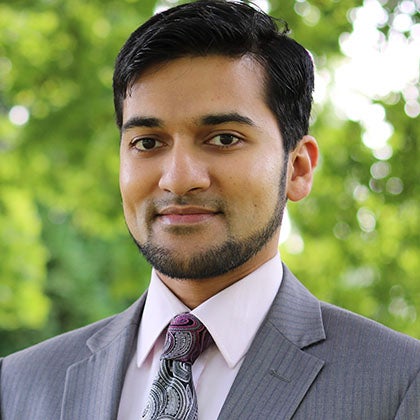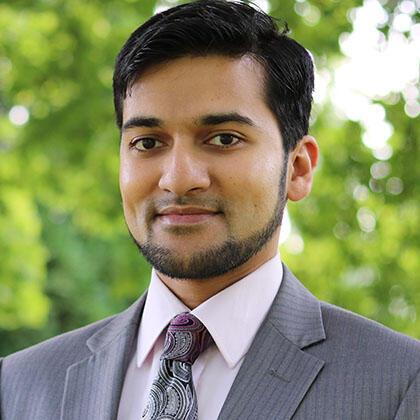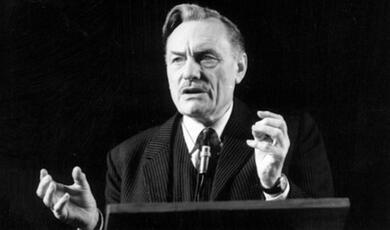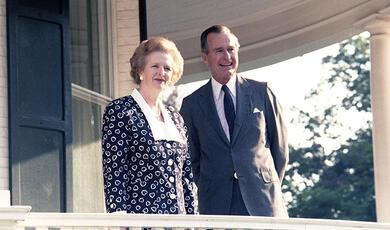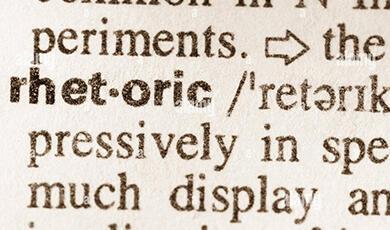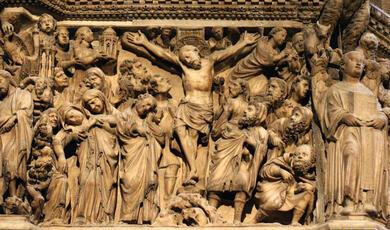What is a Religion? : Rethinking Religion and Secularism
Share
- Details
- Transcript
- Audio
- Downloads
- Extra Reading
Most of us would consider Islam to be a religion, while we would generally view secularism as requiring the limiting of religion to the private sphere. But many scholars (and ideologues) beg to differ. Social scientists are divided over the definitions of religion and secularism, while Islam’s indigenous portrayal of itself as a 'dīn' is not easily translatable into English.
This lecture asks both whether Islam might be viewed as an ideology, and whether secularism could be considered a religion.
Download Transcript
What is Islam? What is Secularism? The ideas that govern the lives of perhaps billions of people around the globe are far from limpid. Rather they are the sight of constant wrangling and contention, often with great passion. Yet, when entire societies are built upon such ideas it behoves us to consider them carefully, if for no other reason than to better understand our fellow human beings. In the present lecture, which I must stress is a work-in-progress, I hope to outline how current scholarship on religion and secularism can call into question one of the founding myths of the modern socio-political order that has emerged as normative in the Western world and in many places beyond its borders.[1] That myth is the sharp conceptual separation between religion and secularism. Over the course of this lecture, I wish to mount a direct critique against this conceptual distinction in conversation with some modern scholars who fall on both sides of this debate. Yet, I think I offer a perspective that remains somewhat in the background of current scholarship. While I will critique scholars who uphold conventional ideas about the categories of religion and secularism, I also oppose another widespread tendency of arguing that religion as a category is a modern invention with no analogues in the premodern world. But I’m getting ahead of myself.
Two Stances on Religion
Let me begin by offering an outline of the structure of my lecture. I will begin by considering the concepts of religion and secularism. How are these concepts typically defined? We will see that there are two major trends in current scholarship. One, which I shall refer to as conventional, considers religions to be traditions of thought and practice rooted in the divine and/or the transcendent. The secular, for these scholars, pertains to worldly non-transcendent phenomena. “Secularism” in this context is a modern post-Enlightenment ideology that views religion as reflecting “tradition” rather than “reason.” According to the secularist historiography, modern people have progressed from a world in which the superstition of religion no longer governs public life or the political realm. A sophisticated version of this may be seen in the work of the noted scholar of religion, Bruce Lincoln.[2]
Contrasting with this conventional approach to religion and secularism, one finds several scholars who bring into question the historical narrative of secularist triumphalism. Such scholars argue that ‘religion’ as a category was effectively invented over the course of modernity as a sort of foil for the emerging secular order. These scholars argue that premodern peoples did not possess a category for what we today call ‘religion’ and that the apparent resemblance of words is superficial. A recent articulation of this position is to be found in the writings of Brent Nongbri and many others.
In this lecture, I wish to adopt a third position. I wish to affirm religion as a category, but perhaps somewhat provocatively, I wish to assert that “Secularism” is properly viewed as a religion. To a certain extent my reading is a consequence of viewing the current debate taking place in the secondary literature as caught up in the overwhelming gravitational pull of a Eurocentric epistemic paradigm. In an effort to provincialise Europe in my own ruminations, I am drawing on the Islamic tradition and its indigenous concept of dīn to explore how it can complicate presuppositions about religion latent in both earlier positions mentioned.
Against the second position mentioned earlier of scholars who argue that the category of religion is a modern invention, I will argue that a concept of religion is to be found in early Islam as well as in the reflections of Muslim scholars over the course of the millennium and a half since the faith’s founding. And against the first, I will argue that definitions of religion can only exclude secularism from the category through a kind of special pleading. The consequence of these arguments are deeply ironic. I will conclude that, contrary to popular prejudice, we in fact live in a world of widespread faith, one dominated by the non-theistic religion of Secularism. The irony inherent in the religion of Secularism is its own self-identity as having transcended religion.
In writing on this topic, I am also drawing on a rich new vein of scholarship that is being explored by a new generation of scholars of Islam in the West who have embarked on similar research in recent years. I should make particular note of Rushain Abbasi’s recent work. The work of this Stanford scholar who earned his doctorate at Harvard earlier this year represents, in my view, the cutting edge of debates around Islam and the categories of religion and the secular in current scholarship. My own reflections on this subject were mostly written before I had the chance to read Abbasi’s more detailed work in this area and so I will naturally not acknowledge it here as much as I hope to in my future work.
What is a Religion?
The notion of religion is notoriously difficult to define. A dictionary definition is a great way to get off on the wrong foot. The Oxford Dictionary of English defines religion as: “The belief in and worship of a superhuman controlling power, especially a personal God or gods.” This reflects a popular understanding of religion, but one that is profoundly Eurocentric. Consider Buddhism which has been called the fourth largest religion in the world. It does not have a conception of God. Indeed, it is sometimes described as atheistic. The conventional understanding of religion thus leaves much to be desired. However, more scholarly definitions also have their problems. One of the most thoughtful scholars in the field of religion in the early twenty-first century is Bruce Lincoln, an emeritus professor at the University of Chicago. In his 2002 work, Holy Terrors: Thinking about Religion after September 11, he engages the common critique in the study of religion of the very category of religion. In doing so, he reaffirms a version of what I have called the “conventional” understanding of religion.
Lincoln’s impetus behind formulating a definition for religion is in response to the influential critique of conventional definitions by Talal Asad, an influential British anthropologist based in the US. Lincoln questions whether Asad’s conclusion that there “cannot be a universal definition of religion,” follows from his premise that this is “not only because its constituent elements and relationships are historically specific, but because that definition is itself the historical product of discursive processes.” In a sense, Lincoln undermines the force of Asad’s assertions by pointing out the imprecision of language in general: “Is not all language ‘the historical product of discursive processes?” he asks. Yet, he adds, the historical situatedness of attempts at definition “hardly renders futile all efforts at definition, however, particularly when one understands these as provisional attempts to clarify one’s thought, not to capture the innate essence of things.” In fairness, Asad speaks of a “universal definition of religion,” something that earlier generations of scholars had actually aspired to. Lincoln’s conception of definition is arguably less ambitious than what Asad is critiquing. Yet, while Lincoln’s definition is provisional, in form, it is quite ambitious.
He proposes that:
A proper definition must therefore be polythetic and flexible, allowing for wide variations and attending, at a minimum, to these four domains:
- A discourse whose concerns transcend the human, temporal, and contingent and that claims for itself a similarly transcendent status. […]
- A set of practices whose goal is to produce a proper world and/or proper human subjects, as defined by a religious discourse to which these practices are connected. […]
- A community whose members construct their identity with reference to a religious discourse and its attendant practices. […]
- An institution that regulates religious discourse, practices, and community, reproducing them over time and modifying them as necessary, while asserting their eternal validity and transcendent value.[3]
I have truncated his presentation, since with each domain, he provides a valuable commentary which I will refer to where necessary to explicate my argument. What is properly speaking unique about religion in Lincoln’s definition is only the first domain which speaks of a discourse possessed of certain qualities. The three remaining domains use the term “religious discourse” in reference to the first domain, indicating that it is that domain that forms the heart of this definition as I will elaborate further below.
Religion as a Transcendent Discourse
In the first and central domain of his definition of religion, Lincoln characterises a religion as “[a] discourse whose concerns transcend the human, temporal and contingent.” In his commentary, he adds that a discourse is religious by virtue of “its claims to authority and truth.” The claim to authority in question is a “claim to transcendent authority” that is grounded in “Scripture, revelation, or immutable ancestral traditions.” In the sciences, by contrast, Lincoln argues, claims are contingent upon “experimentation, calculation, and human reason.”[4]
But this strikes me as a somewhat arbitrary distinction, a case of special pleading. For many of the claims of modern secular ideologies arguably also “transcend the human, temporal and contingent.” The kinds of claims made by Marxism and Neoliberalism can occasionally appear to transcend human contingency in its belief in the nature of markets and how they should operate. These are not usually explicit claims to transcendence—unlike a religion like Islam or Judaism, they do not appeal to a conception of God or the Hereafter. But I would argue that they appear to be predicated on implicit claims to transcendence. Post-Enlightenment claims regarding human reason’s ability to arrive at truth and serve as a source of normative authority while self-consciously temporal in a way that contrasts with the claims of Christianity, is still striking in its claim to truth and authority that transcends the everyday usage of those terms.
But what does transcendency actually refer to for Lincoln? One possibility is that he is referring to something beyond the empirical—something that is beyond the five senses and what can be reasoned from them. This is suggested by his reference to astrophysicists discussing cosmogony arriving at “provisional conclusions based on experimentation, calculation, and human reason.” While he does not make it explicit, he also appears to suggest that the notion of transcendence refers to a belief in the divine—God or gods—or in the case of Eastern religions perhaps, the veneration of ancestors who influence this world from a transcendent realm beyond what can be empirically accessed. But as William Cavanaugh has argued drawing on Timothy Fitzgerald:
“Transcendent notions can include “the ‘Nation,’ the land, the principles of humanism, the ancestors, Communism, ātman-brahman, the goddess of democracy and human rights, Cold Speech, Enlightenment (in various quite different senses), the right to private property, witchcraft, destiny, the ‘Immaculate Conception,’” and so on.”[5]
The separating out of secularism or any of a host of other post-Enlightenment worldviews as separate from “religion” appears to serve simply as a means of making a special case of the former.
This is further underlined when considering the consequences of these claims to transcendent authority and truth in the case of a religion like Islam. In its historically dominant form, accepting Islam entailed certain beliefs and practices. The beliefs pertain to the transcendent belief in a unitary God, prophets who are recipients of revelation from God, and Scriptures borne by such prophets, among a host of other details. In terms of practice, a relatively elaborate system of rituals and social norms are prescribed, recommended, discouraged, and prohibited. There is also a vast arena of life on which Islam is silent, indicating normative neutrality.
One could argue that many post-Enlightenment secular ideologies share certain discursive structures with this first and central domain that sets out what is unique about religion. While secular systems do not require and often preclude belief in a transcendent being or beings in the form of God or gods, much like non-theistic traditions like Buddhism, a commitment to certain values can be viewed as necessary to being a member of a particular ideology. Indeed, much of modern Western philosophy in recent centuries has been preoccupied with detailing the finer points of such normative value systems as might prioritise the ordering of society in line with values that may be deemed “transcendental” in this less conventional sense. The epistemological basis for these is different to some of those made by religions like Islam and Buddhism—the former based on a Prophet claiming relatively direct revelation from God, and the latter being based on the teachings of a figure’s claimed to have achieved a state of nirvana. Neither claim is empirically verifiable. But post-Enlightenment philosophies do not provide empirically verifiable claims as a basis for their truth claims in the way that scientists do.
Liberalism as a lived tradition may be viewed as preoccupied with a hypostatised value of “individual liberty,” in a way not unlike a traditional religion conceives of core tenets of its teachings. It may be argued that this is a purely worldly value in its grounding, but the choice to privilege this value amongst a raft of others is undertaken as part of a tradition of thought that, I would argue, is analogous to the way in which religious discourses prioritise values. Philosophers like Alasdair MacIntyre and Charles Taylor have notably argued that humans must necessarily conduct themselves in normative spaces whose philosophical foundations are ultimately empirically unverifiable. An earlier generation of philosophers would have argued that such empirically unverifiable beliefs were ipso facto “metaphysical,” i.e., possessed of no truth value.
In an endnote, Lincoln is willing to concede that the upholders of some ideologies, such as “Marxists with extreme confidence in historic dialectics” cause blurring of the lines between religion and ideology in practice.[6] But he does not justify why the line is there to begin with—one that might strike a Muslim theologian as special pleading for secular exceptionalism. Lincoln’s commentary on the first domain further notes that religious propositions “position themselves as truths to be interpreted, but never ignored or rejected. Contestation then takes place within the realm of hermeneutics.” Ideological truths, I would argue, would demand similar allegiance. The axioms are a given and rejecting them would be tantamount to relinquishing a given ideology, or in the case of what Lincoln calls a religion, rejecting the religion in question.
Finally, Lincoln argues, “Religious discourse can recode virtually any content as sacred, ranging from the high-minded and progressive to the murderous, oppressive, and banal.” But this is also true for ideology. If we consider (imperial) US wars in the Middle East, both under the Neoconservatives in power at the time that Lincoln published his book, and the liberals who took over under Obama from 2009 onwards, in both cases, a patriotic belief in American exceptionalism rendered the “murderous, oppressive, and banal” to be recoded as a virtually sacred duty. In the US case, given the Christian disposition of much American politics in the early twenty-first century, it was sometimes literally cast as a “sacred” duty. Consider, for example, former President George W. Bush’s belief that the invasion of Iraq in 2003 was divinely mandated. But if the word “sacred” is understood functionally it becomes less clear what divides what Lincoln calls religious from ideological practices that define modern secular societies, states and the ideologies that bind them.
One could argue that religion is made a special case of in much scholarly discussion in order to uphold the myth of secular exceptionalism. Secularism’s religious character cannot be conceded without calling into question so many fundamental components of the belief system that constitutes it and its self-image as an advance on humanity’s ingenuous religious disposition of a bygone age. Yet, as noted in the introduction, plenty of scholars today argue, in stark contrast with the claims of Lincoln, that religion is an idea invented by modern Europeans with no analogue in premodern times. In what follows, I will briefly outline this position before turning to a premodern Islamic conception of dīn which I translate as “religion.”
Scholars Who Reject the Category “Religion”
Religion, according to what is a widespread view in Western scholarship was a category that was developed by Europeans to refer to their own post-Enlightenment understanding of Protestant Christianity. Religion was primarily a private belief in God that did not, and should not, impinge on the public sphere. The public sphere, according to this view, was meant to be a secular sphere. Religion and secularism were thus opposites constructed in the wake of socio-political transformations of the seventeenth century. One scholar who holds that religion is a modern category is Brent Nongbri.
In his relatively recent consideration of the subject of religion, Brent Nongbri has reasserted the need to deal carefully with the term “religion” because of its modern European genealogy. In fact, he avers that the term, as used today, refers to “anything that sufficiently resembles modern Protestant Christianity.”[7] Nongbri consequently argues that asking a question like “is X a religion?” is simply to compare it to Protestant Christianity.
Though while he considers the word problematic, Nongbri recognises that the term religion cannot reasonably be dispensed with altogether as some scholars have argued. As he notes in his work’s conclusion:
“All of our words and conceptual tools have histories. In this book, I have interrogated the word “religion,” and in doing so, I have been somewhat cavalier in my use of other words such as “culture,” “society,” and “ethnicity,” to name just three. All these terms could (and should) be subjected to the kind of scrutiny that I have applied to “religion.” But all these terms also form important parts of the vocabulary that historians use all the time. To simply jettison them wholesale is impractical and out of keeping with the Wittgensteinian approach to language that I have advocated elsewhere in this book. Words are social products, and as such, they never offer perfect clarity. But a greater degree of self-consciousness about the words we use is definitely something to be desired.”[8]
Such a passage does make one wonder what all the fuss is ultimately about. It should not surprise scholars in our day that none of our concepts, which are by definition socially constructed, are “universal,” whatever that means. Rather they are all coloured by our normative assumptions about what they represent. Ideas like “culture,” “society,” “state,” “politics,” “economics,” “nation,” or indeed: “time,” “household,” or “transportation” will always be highly situated in a particular social and historical context. That we, and thus our ideas and conceptions are bounded by time and place seems fairly obvious, although it is true that the relative nature of our perspectives is generally ignored in popular culture and political discourse, i.e., outside academia. Nongbri and other scholars’ concerns help fellow scholars recognise the problems caused by using the term religion unreflectively, and this is what I feel is the major contribution of these scholars to our understanding of this term. Yet, as I stated at the outset of this discussion, premodern Muslim scholars developed relatively sophisticated conceptions of religion. I shall now turn to one such scholar from the premodern tradition to illustrate this.
A Premodern Scholar on Religion
Religion as a category is discernible in the writings of Muslim scholars hundreds of years before the term for it crystalised in Europe. Indeed, contrary to what Nongbri has argued, it is discernible in the founding scripture of Islam, the Qur’an. Articulated as the word dīn, it is used to refer to Islam as well as other non-Islamic worldviews. In the Qur’an and in Prophetic reports (hadiths), the normative practices of the Meccans who were opposed to the Prophet in the early part of his ministry are referred to as dīn.[9]
An important Qur’anic lexicographer, who may be considered an authoritative example of classical thinking about the term’s meaning as found in the Qur’an is al-Rāghib al-Isfahānī (d. 502/1108). In his Mufradāt Alfāẓ al-Qurʾān al-Karīm, he defines dīn as follows: “Dīn refers [linguistically] to obedience (tāʿa) and recompense (jazāʾ), and [refers] technically (majāzan) to law (sharīʿa). dīn is similar to milla but takes into consideration obedience and compliance with the law.”[10] The reference to milla obliges us to consider how al-Isfahānī defines this term in the same work. While the term in modern Arabic refers to a religious community, in al-Isfahānī’s fifth/eleventh century work, it is more narrowly defined. Milla, he says, is synonymous with religion (ka-l-din) and refers to that which God has prescribed (sharaʿa) upon His servants through prophets (anbiyāʾ) so that they may achieve His protection thereby.[11] Al-Isfahānī adds that the word milla is used in connection with God’s prescriptions (mā sharʿahu Allāh) whereas dīn is used with reference to the individual who undertakes to uphold it, since its original meaning is obedience (tāʿa). We can understand from al-Isfahānī’s definition that the words dīn and milla are very similar in meaning, and that both incorporate more than mere belief to include practical prescriptions designated with the Arabic word sharīʿa which I have translated “law,” but which obviously has a wider meaning than the latter word in its conventional usage. Indeed, if I am arguing that the Islamic tradition offers its own conception of what constitutes a religion, I cannot but argue that the Islamic tradition has its own conception of law.
Returning to al-Isfahānī’s treatment of the word dīn as he understands its usage in the Qur’an, he provides several Qur’anic verses in which he views his definition as applying. As we have seen, this definition focuses on the linguistic meaning of the word, namely “obedience and recompense” and extends to include obedience to a divinely revealed law. Examples of this usage in the Qur’an according to al-Isfahānī include a verse commonly translated to describe Islam as the true religion: “Indeed the [only] dīn [acceptable] with God is Islam” (Q. 3:19). Al-Isfahānī makes clear that he understands dīn, in this instance, to refer to obedience to the Sharia.[12]
This brief treatment of al-Isfahānī’s indicates an understanding of religion that has informed my own understanding of religion in the preceding sections. It has a broader remit than the post-Enlightenment conception that treats religion as a privatised belief. It is what Lincoln describes as a “maximalist religion.” Yet, as alluded to in the outset of the present lecture, I have deliberately undertaken to invert the Eurocentrism of attempts to understand religion with reference primarily to European history. By contrast, I am suggesting that by drawing on Islamic conceptions of religion, a choice no more arbitrary than drawing on post-Enlightenment European conceptions, one arrives at a strikingly different answer to the question of what counts as a religion. Yet, even if we draw on recent Western critiques of the religious-secular binary, we can arrive at a recognition of the arbitrariness of the distinction between these two concepts.
Conclusion
Of course, Secularism rejects the notion that it is analogous to the religions of old. It has historically seen itself as a uniquely rational enterprise that has transcended the superstition of premodern religions. Those religions now belonged in the private sphere of the modern secular order. According to an influential Secular viewpoint, this was essential to maintaining the peace and preventing the world from being riven by superstitious wars over otherworldly salvation. But in fact, Secularism was simply, even ingenuously, merely re-enacting the established pattern of a new universal religious project. It had simply come to recognise its own salvific qualities and thus it was only reasonable that it supersedes the primitive paradigms of religion in the public sphere. Secularism was the new dispensation brought for the salvation of humanity, and it was for humanity’s own good that it be accepted in one ideological form or another. Yet, unlike a religion like Islam whose scriptures offered the ostensibly unbeatable claim that God had sent it as the final revelation through a final ‘Prophet to end all prophets’, Secularism could claim that it had superseded the category of religion itself. This was, in many ways, a masterstroke of self-legitimation, for it cleared away all the traditional competitors for authority in the public realm. By masking itself as transcending religion, Secularism has arguably found a means of legitimising itself that has proven remarkably effective. It has called for religion to be largely removed from public life except in a symbolic or vestigial form. In doing so, it has rendered the public sphere a realm over which it exercises a monopoly of legitimate force.
Yet, I have tried to suggest over the course of this presentation that there is a deep contradiction at the heart of Secularism as it currently stands, namely that it upholds the principle of separating religion from state, or in more recent articulations, that it is embodied in the state’s neutrality between or equidistance from all religious traditions. Yet, if Secularism is indeed itself a religion, then the claim that the secular state is separate from religion breaks down. How can the secular state be neutral between religions if it is governed by the rules of one particular religion, namely Secularism? I don’t have answers to these questions, versions of which have been posed by certain Christian scholars for some time now. But I do think posing such questions from an Islamic perspective is important in helping us recognise the need for our society to acknowledge that the conversation in these areas needs to be broadened to include a wider range of viewpoints to better reflect the people who make up our increasingly diverse societies. The conversations these kinds of reflections might open up can be enriching and mind-broadening in ways that, I hope, will foster greater mutual respect and understanding. If what I say contributes to such an outcome, I will consider my brief presentation to have done its job.
© Professor al-Azami 2021
References and Further Reading
Abbasi, Rushain. "Islam and the Invention of Religion: A Study of Medieval Muslim Discourses on Dīn." Studia Islamica 116.1 (2021): 1-106.
Cavanaugh, William T. The Myth of Religious Violence: Secular Ideology and the Roots of Modern Conflict. Oxford: Oxford University Press, 2009.
Lincoln, Bruce. Holy Terrors: Thinking About Religion After September 11. Chicago: University of Chicago Press, 2003.
Nongbri, Brent. Before Religion: A History of a Modern Concept. New Haven: Yale University Press, 2013.
Schilbrack, Kevin. "The Social Construction of “Religion” and Its Limits: A Critical Reading of Timothy Fitzgerald." Method & Theory in the Study of Religion 24.2 (2012): 97-117.
[1] I continue to use the expression “Western” in what some scholars would consider an overly reified sense. In keeping with Kevin Schilbrack’s observations, I do not believe that the socially constructed nature of an idea like the West means that it is not “real” in important senses, just as socially situated phenomenon (e.g. fiat money, or national borders) can be considered real despite their simply being ideas thought up by humans in relatively recent history. This is not to say that engaging in deconstructive critique is not often a valuable exercise with respect to ideas like the “West.”
[2] For Lincoln’s work, please consult the references below.
[3] Bruce Lincoln, Holy Terrors, 5-8.
[4] Ibid.
[5] Timothy Fitzgerald, “A Response to Saler, Benavides, and Korom,” Religious Studies Review 27, no. 2 (April 2001): 114. Cited in William T. Cavanaugh, The Myth of Religious Violence, 103.
[6] Lincoln, Holy Terrors, 115, n. 16.
[7] Brent Nongbri, Before Religion, 18.
[8] Brent Nongbri, Before Religion, 157.
[9] Q. 109:6 is a relatively transparent example of the Qur’anic conception of religion. Countless examples may be found in hadith where the meaning corresponds to an Islamic conception of religion.
[10] In Arabic, this reads: al-din yuqāl li-l-ṭāʿa wa-l-jazāʾ wa-ustuʿīra li-l-sharīʿa. Wa-l-Dīn ka-l-milla wa-lākinnahu yuqāl iʿtibāran bi-l-ṭāʿa wa-l-inqiyād li-l-sharīʿa. See: https://archive.org/details/waq34923/page/n231/mode/2up.
[11] https://archive.org/details/waq34923/page/n609/mode/2up
[12] https://archive.org/details/waq34923/page/n231/mode/2up, 233.
References and Further Reading
Abbasi, Rushain. "Islam and the Invention of Religion: A Study of Medieval Muslim Discourses on Dīn." Studia Islamica 116.1 (2021): 1-106.
Cavanaugh, William T. The Myth of Religious Violence: Secular Ideology and the Roots of Modern Conflict. Oxford: Oxford University Press, 2009.
Lincoln, Bruce. Holy Terrors: Thinking About Religion After September 11. Chicago: University of Chicago Press, 2003.
Nongbri, Brent. Before Religion: A History of a Modern Concept. New Haven: Yale University Press, 2013.
Schilbrack, Kevin. "The Social Construction of “Religion” and Its Limits: A Critical Reading of Timothy Fitzgerald." Method & Theory in the Study of Religion 24.2 (2012): 97-117.
This event was on Tue, 09 Nov 2021
Support Gresham
Gresham College has offered an outstanding education to the public free of charge for over 400 years. Today, Gresham plays an important role in fostering a love of learning and a greater understanding of ourselves and the world around us. Your donation will help to widen our reach and to broaden our audience, allowing more people to benefit from a high-quality education from some of the brightest minds.


 Login
Login
